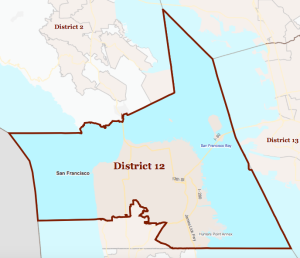Editor’s note: The presidential nominating contests in both parties will come down to the California primary.
For Democrats, 548 delegates are at stake — 11.5% of the total. For Republicans, 172 delegates are at stage — 6.9% of the total. Of those, for Democrats, 158 (29%) are divided proportionally on a statewide basis, while 317 (58%) are divided proportionally by congressional district, with each district providing between 5 and 8 delegates. The remaining 73 (13%) are “superdelegates.”
For Republicans, 13 (8%) are awarded statewide, with ten going to the candidate with the highest number of votes on a winner-take-all basis, and three going to “pre-determined” delegates (the State Chair, National Committeewoman, National Committeeman). Meanwhile, 159 (92%) are awarded by congressional district on a winner-take-all basis, with each district providing 3 delegates.
The result: a district-by-district battle in both parties, which we preview for you here.
CA-12: Welcome to Pelosi-land. The beating heart of the liberal elite, this jewel of a district defines the romantic self-conception of the left. It has more Democratic delegates — nine — than any other. Yet while fewer than 10% of the district’s voters are Republicans, those roughly 30,000 votes could have as much sway as the hundreds of thousands of votes in conservative districts further east. That alone makes it worth the Republicans’ while.
Prospects:
Democrats: Bernie Sanders will win a close-fought and bitter contest for bragging rights in Pelosi’s home base.
Sanders 5, Clinton 4
Republicans: This is one of the few districts where a strong investment by John Kasich might well pay off.
Kasich 3, Trump 0, Cruz 0
Joel B. Pollak is Senior Editor-at-Large at Breitbart News. His new e-book, Leadership Secrets of the Kings and Prophets: What the Bible’s Struggles Teach Us About Today, is on sale through Amazon Kindle Direct. Follow him on Twitter at @joelpollak.


COMMENTS
Please let us know if you're having issues with commenting.